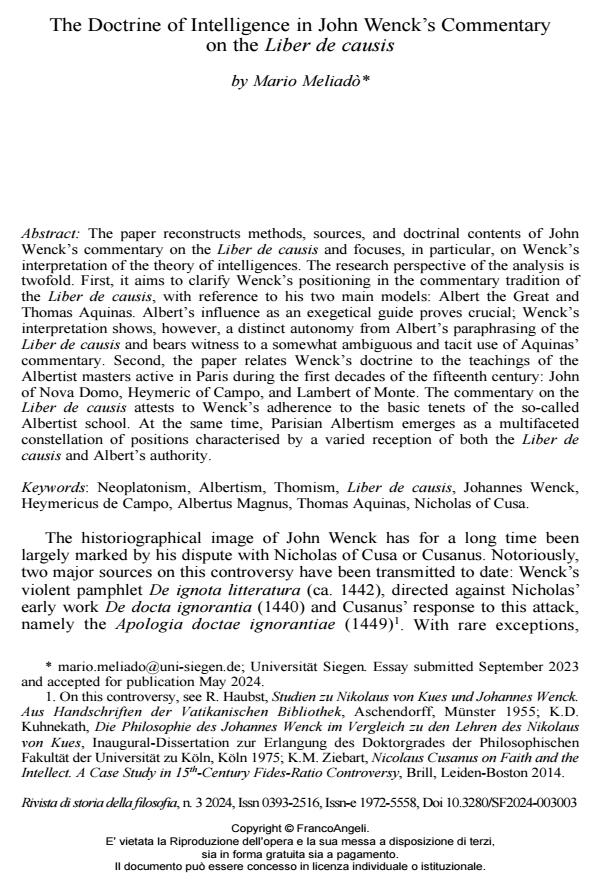The Doctrine of Intelligence in John Wenck’s Commentary on the Liber de causis
Titolo Rivista RIVISTA DI STORIA DELLA FILOSOFIA
Autori/Curatori Mario Meliadò
Anno di pubblicazione 2024 Fascicolo 2024/3
Lingua Inglese Numero pagine 26 P. 523-548 Dimensione file 216 KB
DOI 10.3280/SF2024-003003
Il DOI è il codice a barre della proprietà intellettuale: per saperne di più
clicca qui
Qui sotto puoi vedere in anteprima la prima pagina di questo articolo.
Se questo articolo ti interessa, lo puoi acquistare (e scaricare in formato pdf) seguendo le facili indicazioni per acquistare il download credit. Acquista Download Credits per scaricare questo Articolo in formato PDF

FrancoAngeli è membro della Publishers International Linking Association, Inc (PILA), associazione indipendente e non profit per facilitare (attraverso i servizi tecnologici implementati da CrossRef.org) l’accesso degli studiosi ai contenuti digitali nelle pubblicazioni professionali e scientifiche.
The paper reconstructs methods, sources, and doctrinal contents of John Wenck’s commentary on the Liber de causis and focuses, in particular, on Wenck’s interpretation of the theory of intelligences. The research perspective of the analysis is twofold. First, it aims to clarify Wenck’s positioning in the commentary tradition of the Liber de causis, with reference to his two main models: Albert the Great and Thomas Aquinas. Albert’s influence as an exegetical guide proves crucial;; Wenck’s interpretation shows, however, a distinct autonomy from Albert’s paraphrasing of the Liber de causis and bears witness to a somewhat ambiguous and tacit use of Aquinas’ commentary. Second, the paper relates Wenck’s doctrine to the teachings of the Albertist masters active in Paris during the first decades of the fifteenth century: John of Nova Domo, Heymeric of Campo, and Lambert of Monte. The commentary on the Liber de causis attests to Wenck’s adherence to the basic tenets of the so-called Albertist school. At the same time, Parisian Albertism emerges as a multifaceted constellation of positions characterised by a varied reception of both the Liber de causis and Albert’s authority.
Parole chiave:Neoplatonism, Albertism, Thomism, Liber de causis, Johannes Wenck, Heymericus de Campo, Albertus Magnus, Thomas Aquinas, Nicholas of Cusa.
Mario Meliadò, The Doctrine of Intelligence in John Wenck’s Commentary on the Liber de causis in "RIVISTA DI STORIA DELLA FILOSOFIA" 3/2024, pp 523-548, DOI: 10.3280/SF2024-003003